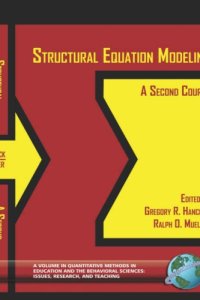
Ebook: Structural Equation Modeling: A Second Course
- Series: Quantitative Methods in Education and the Behavioral Science
- Year: 2006
- Publisher: Information Age Publishing
- Language: English
- pdf
A volume in Quantitative Methods in Education and the Behavioral Sciences: Issues, Research, and Teaching (sponsored by the American Educational Research Association’s Special Interest Group: Educational Statisticians) Series Editor Ronald C. Serlin, University of Wisconsin-MadisonThis volume is intended to serve as a didactically-oriented resource covering a broad range of advanced topics often not discussed in introductory courses on structural equation modeling (SEM). Such topics are important in furthering the understanding of foundations and assumptions underlying SEM as well as in exploring SEM as a potential tool to address new types of research questions that might not have arisen during a first course. Chapters focus on the clear explanation and application of topics, rather than on analytical derivations, and contain syntax and partial output files from popular SEM software. CONTENTS: Introduction to Series, Ronald C. Serlin. Preface, Richard G. Lomax. Dedication. Acknowledgements. Introduction, Gregory R. Hancock & Ralph O. Mueller. Part I: Foundations. The Problem of Equivalent Structural Models, Scott L. Hershberger. Formative Measurement and Feedback Loops, Rex B. Kline. Power Analysis in Covariance Structure Modeling, Gregory R. Hancock. Part II: Extensions. Evaluating Between-Group Differences in Latent Variable Means, Marilyn S. Thompson & Samuel B. Green. Using Latent Growth Models to Evaluate Longitudinal Change, Gregory R. Hancock & Frank R. Lawrence. Mean and Covariance Structure Mixture Models, Phill Gagn?. Structural Equation Models of Latent Interaction and Quadratic Effects, Herbert W. Marsh, Zhonglin Wen, & Kit-Tai Hau. Part III: Assumptions. Nonnormal and Categorical Data in Structural Equation Modeling, Sara J. Finney & Christine DiStefano. Analyzing Structural Equation Models with Missing Data, Craig K. Enders. Using Multilevel Structural Equation Modeling Techniques with Complex Sample Data, Laura M. Stapleton. The Use of Monte Carlo Studies in Structural Equation Modeling Research, Deborah L. Bandalos. About the Authors.
Download the book Structural Equation Modeling: A Second Course for free or read online
Continue reading on any device:

Last viewed books
Related books
{related-news}
Comments (0)